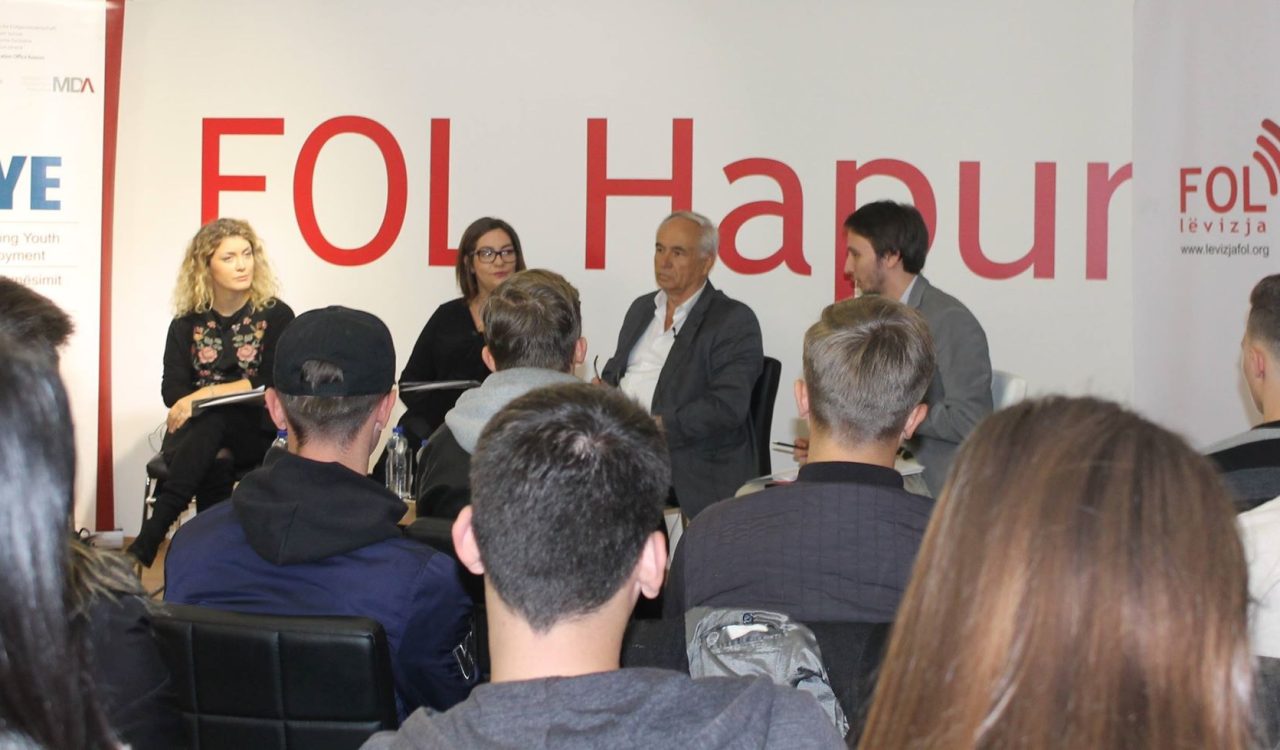Youth remains inclusive in decision-making processes
Prishtina, 31 October 2017 – Lëvizja FOL today has held an open discussion on the topic “Social Dialogue: How to Involve Youth in Dialogue and what has KES done in this regard”. Panelists in this discussion were: Brikena Hoxha from the Kosovo Stability Initiative, Fjolla Bajraktari, Innovation Lab Kosovo / PEN and Rashit Mehmeti from the Union of Independent Trade Unions of Kosovo (BSPK).
Gersi Gashi from Movement FOL presented the findings of the report “Social Dialogue in Kosovo: The role of CES and the involvement of youth in dialogue”. Gashi said that this policy paper is divided into several parts where they have been analyzed: the legislation and consequently the mandate of the Economic and Social Council in Kosovo (KES), the work and achievements of the KES since its establishment, the comparison of KES with other countries and recommendations to increase the impact of KES. “Social dialogue is a very important process for the proper functioning of the state and for a democratic governance system. In Kosovo, as a term, but also in politics, social dialogue is not well-known to the general public. ESC in Kosovo has the role of pushing ahead of social dialogue. As a mechanism that brings together representatives of employers, employees, and the Government, it is clear that the ESC has a duty to ensure inclusiveness in dialogue, raising awareness of social dialogue and encouraging the entire society to be part of it, including here also youth, “said Gashi.
Brikena Hoxha from Kosovo Initiative said that even after nine years of independence, Kosovo remains a country with great poverty and unemployment. “Since 2009, progress reports have highlighted the need to improve legislation in the social field. The term modern slavery is the best description of the situation of workers in the private sector, and especially in small businesses, “said Hoxha, adding that only in 2017 there are 15 deaths in the workplace, most of them in the construction sector. She said the challenge remains the non-implementation of the collective contract, especially in the private sector. “I think Kosovo must take three measures to increase employment: Increased commitment of youth to the Syndicate, state support with StartUps grants and compilation of practices that add to the engagement of young people,” said Hoxha.
Rashit Mehmeti from the Independent Trade Unions of Kosovo (BSPK) said that by 2011 members of KES did not receive compensation and this could have had an impact on the fact that ESC was not very effective. “The minimum wage has been many times in the agenda where we asked for it to be 220-250 €, but this does not suit business representatives,” said Mehmeti. Moreover, he added that youth involvement is now the target of BSPK, and internal reforms are underway that will push this forward.
Fjolla Bajraktari, from Innovation Lab Kosovo / PEN, said that the education system in Kosovo itself does not promote educational debate in schools and so young people are not ready to debate. “We have held workshops every three months in the villages of Kosovo municipalities, where at first there was hesitation of young people to participate and sometimes there was also hesitation of decision-makers to cooperate,” Bajraktari. But most of the cases have turned out to be stories of success, and it has been seen that there is a desire for young people to engage in greater involvement, especially in decision-making, Bajraktari added.
This activity was supported by Enhancing Youth Employment – EYE Project – project of the Swiss Cooperation Office and implemented by Helvetas Swiss Cooperation and MDA.
